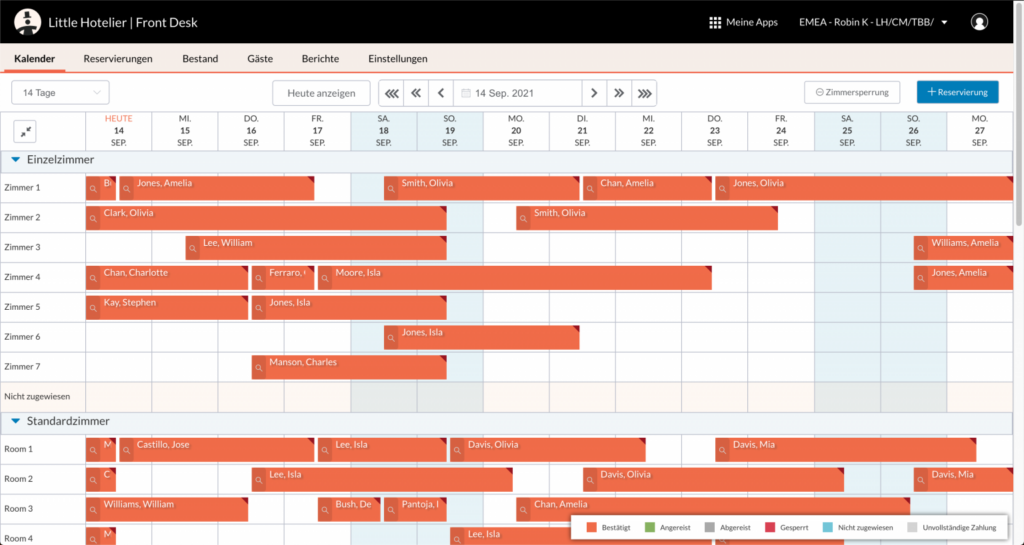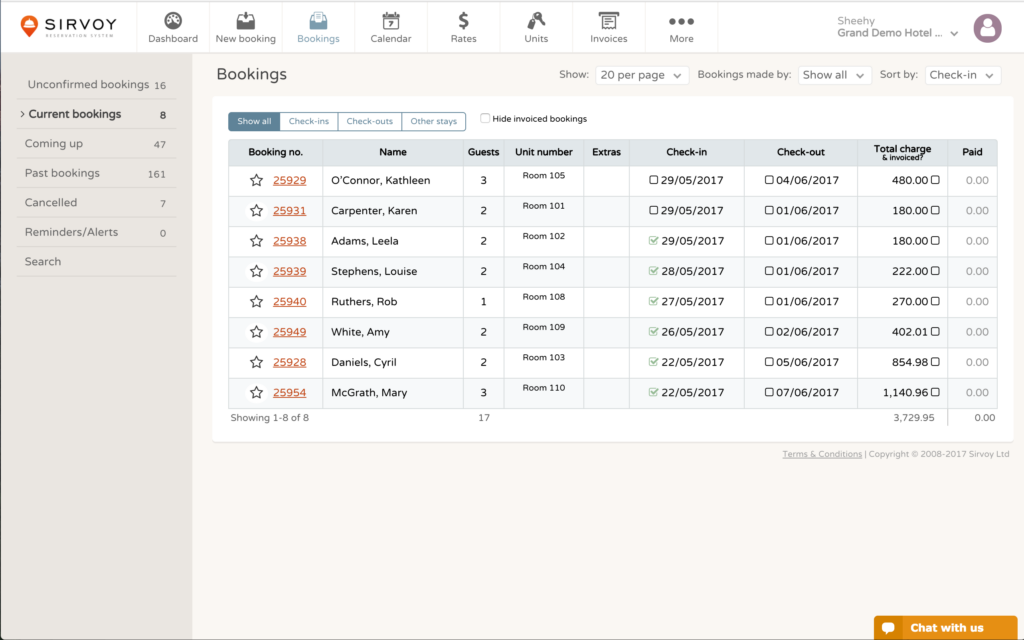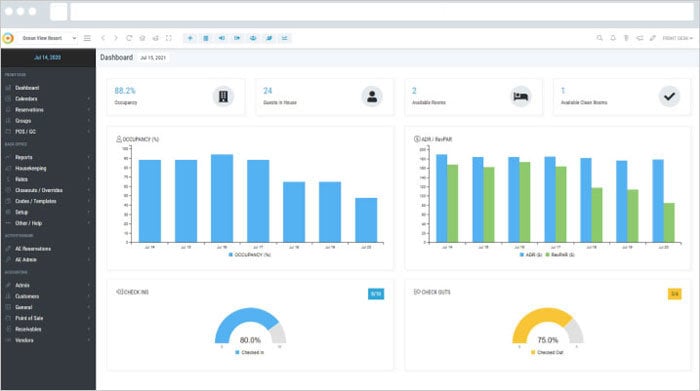13 Best Property Management Software for Hotels
After evaluating a myriad of tools, I've curated the 13 best property management software for hotels. Handpicked to address your operational challenges, let's dive in!
- Shiji Enterprise Platform - Best for hotel chains with a global presence
- ThinkReservations - Best for streamlining front desk operations
- RoomKeyPMS - Best for integrating with POS and CRM systems
- Visual Lease - Best for managing lease obligations and costs
- SiteMinder - Best for seamless channel management
- Little Hotelier - Best for small hotel businesses
- MRI @Work - Best for handling complex property portfolios
- Sirvoy - Best for its user-friendly interface
- Solonis - Best for data analytics and business intelligence
- Resort Data - Best for handling resort and timeshare properties
- Cloudbeds - Best for managing multiple hotel groups
- Buildium - Best for commercial property management
- WebRezPro - Best for advanced reservation tracking
As a former hotel owner in the bustling hospitality industry, I deeply understand the significance of robust hotel management software. A property management solution, especially a cloud-based property management system (cloud PMS), can completely transform the way you operate your hospitality business, from streamlining the front office to optimizing back office tasks.
Be it independent hotels, hostels, inns, motels, B&Bs, campgrounds, or on-premise small properties, a hotel PMS can simplify day-to-day operations, enhance the guest experience, and ultimately boost profitability.
In essence, a good PMS software is like the central nervous system of your hotel. It brings automation to routine tasks, enabling you to focus on guest management and creating an exceptional guest experience.
The pain points such software can alleviate are numerous, including time-consuming manual tasks, poor guest communication, inability to upsell effectively, or inefficiencies in managing your rental property. The software can also effectively handle messaging, enabling you to engage with your guests and cater to their needs in a timely manner.
In today's day and age, where profitability and customer satisfaction are directly linked, choosing the right PMS software can be a game-changer. I've taken the time to comb through the various options available to you in the market. My aim is to help you find the perfect fit for your needs, so you can focus on what you do best - providing unforgettable experiences in the hospitality industry.
What Is a Property Management Software for Hotels?
Property management software for the hotel industry is a game-changing tool utilized by hoteliers, property owners, and hospitality professionals to streamline and automate operational tasks. From reservation and occupancy management to billing, maintenance, and customer relationships, these solutions cover every facet of hotel management.
They serve as a digital backbone, enhancing operational efficiency, reducing manual errors, and boosting guest satisfaction. Whether managing a boutique hotel, a large hotel chain, or a resort, users leverage property management software to ensure a smooth, seamless operation that keeps guests coming back for more.
They can integrate with your hotel website, allowing direct bookings, managing online reservations from travel agents or social media, and even helping upsell by leveraging guest data. And with features like contactless check-ins and open API, these PMS solutions can ensure your property stays at the forefront of technology.
12 Best Property Management Software for Hotels Overview
1. Shiji Enterprise Platform - Best for hotel chains with a global presence

Shiji Enterprise Platform is a cutting-edge property management software tailored for the hotel industry, providing comprehensive tools and services to streamline operations, enhance guest experiences, and improve revenue management. As a global leader in the hospitality technology sector, Shiji aims to connect the diverse aspects of hotel management through a seamless, integrated platform, offering unparalleled support to hoteliers worldwide.
Why I Picked Shiji Enterprise Platform:
As a property management software for hotels, Shiji Enterprise Platform excels in offering a unified system that simplifies complex operational tasks, from room bookings to guest services management. Its strength lies in the ability to integrate various hotel operations into one easy-to-use platform, enabling efficient management of hotel bookings, guest communications, and service offerings. Shiji’s focus on data analytics and real-time reporting also allows hoteliers to make informed decisions, enhancing operational efficiency and guest satisfaction.
Standout features & integrations:
Key features of Shiji Enterprise Platform include: centralized reservations, guest profile management, real-time analytics, mobile check-in and check-out, revenue management, integration with third-party services, customizable reports, multi-property support, maintenance management, and guest feedback collection. The Shiji Enterprise Platform integrates with 3CX, 4Suites, Adyen, Alliants, Amadeus, Assa Abloy Global Solutions, Avaya, Cendyn, Duetto, and IDeaS, among others.
Pricing:
Pricing for the Shiji Enterprise Platform is available upon request and tailored to your unique business needs. Contact them on their website for a quote.
Pros:
- Comprehensive integration capabilities streamline various hotel operations
- Real-time data analytics for informed decision-making
- Global support network provides assistance in multiple languages
Cons:
- May require extra training to utilize all advanced features
- Initial setup and customization takes time
2. ThinkReservations - Best for streamlining front desk operations

ThinkReservations is a high-powered property management software designed to make hotel operations more efficient. With a clear emphasis on front desk tasks, it gives users the ability to streamline check-ins, check-outs, and guest interactions, making it an optimal solution for those focused on improving front desk operations.
Why I Picked ThinkReservations:
I picked ThinkReservations for this list because it offers a feature-rich, easy-to-use interface that simplifies the often complicated front desk processes. In comparing several tools, ThinkReservations stood out for its dedication to streamlining the entire guest journey, from reservation to check-out, making it the perfect tool for hoteliers looking to enhance their front desk operations.
Standout features & integrations:
ThinkReservations offers key features like a reservation calendar, detailed guest profiles, and integrated credit card processing. Its reporting and analytics capabilities also provide insightful data to improve operational efficiency. In terms of integrations, ThinkReservations can seamlessly connect with numerous distribution channels, payment gateways, website platforms, and other useful hotel management tools.
Pricing:
ThinkReservations pricing starts from $50/user/month (billed annually). This includes all standard features and customer support, with additional costs for advanced features and integrations.
- Pros:
- Streamlines front desk operations
- Comprehensive feature set
- Numerous integration options
- Cons:
- Steeper price point may be prohibitive for small hotels
- Some features require additional costs
- Might require training to fully utilize the system
3. RoomKeyPMS - Best for integrating with POS and CRM systems

RoomKeyPMS is a property management software that shines in enhancing hotel operations through seamless integration with POS and CRM systems. With an ability to merge with these crucial tools, it presents an efficient way to manage the various aspects of hotel operations, from customer relations to point-of-sale transactions.
Why I Picked RoomKeyPMS:
I chose RoomKeyPMS because its impressive capacity to integrate with POS and CRM systems sets it apart. In a landscape where technology interfaces are critical, this attribute makes it stand out. Thus, I believe RoomKeyPMS is best for hoteliers who need to ensure that their property management software can connect effortlessly with POS and CRM tools.
Standout features & integrations:
RoomKeyPMS includes features like real-time booking management, mobile check-in/check-out, and detailed performance reports. Additionally, it supports third-party integrations with popular POS systems and CRM platforms, allowing for better customer engagement and improved sales management.
Pricing:
RoomKeyPMS offers pricing from $110/user/month (billed annually). This fee covers the cost of the standard system, with additional charges for advanced features and integrations.
- Pros:
- Seamless integration with POS and CRM systems
- Real-time booking management
- User-friendly interface
- Cons:
- Higher price point than some competitors
- Some advanced features require additional cost
- Lack of customizability in some areas
4. Visual Lease - Best for managing lease obligations and costs

Visual Lease is a lease management solution that provides in-depth analysis and control of lease obligations and costs. It combines data management and accounting rules to help hoteliers effectively manage leases, making it an excellent tool for keeping tabs on property-related financial commitments.
Why I Picked Visual Lease:
I chose Visual Lease for this list due to its robust features that focus specifically on lease management - a critical but often overlooked aspect of property management. Its unique combination of data management and adherence to accounting standards make it the best choice for hoteliers aiming to optimize their handling of lease obligations and costs.
Standout features & integrations:
Visual Lease's features include lease accounting compliance, critical date tracking, and expense management. The software supports integration with ERP systems like Oracle and SAP, enabling seamless data exchange and improving operational efficiency.
Pricing:
Visual Lease's pricing starts from $100/user/month. Please note, however, that this is a starting price, and additional charges may apply for extra features or larger user numbers.
- Pros:
- Effective lease obligation and cost management
- Compliance with lease accounting standards
- Integration with popular ERP systems
- Cons:
- Price might be high for smaller hotels
- Learning curve for non-finance users
- Advanced features may come with additional costs
5. SiteMinder - Best for seamless channel management

SiteMinder is a cloud-based platform that offers hotels efficient channel management and online booking capabilities. It allows hoteliers to manage all their online distribution from one place, making it the ideal choice for those aiming to streamline their channel management process.
Why I Picked SiteMinder:
I picked SiteMinder because of its strong focus on channel management, something I consider to be crucial in the era of digital marketing and online booking platforms. Its ability to consolidate online distribution into a single, accessible place sets it apart from other property management systems. This feature, I believe, makes SiteMinder the best solution for hotels aiming to simplify and optimize their channel management.
Standout features & integrations:
SiteMinder offers a channel manager, an online booking engine, a website builder, and a global distribution system (GDS). It integrates with major OTAs like Booking.com, Expedia, and TripAdvisor, as well as important PMS systems and Revenue Management Systems, ensuring a fully connected operational flow.
Pricing:
Pricing for SiteMinder starts from $40/user/month. Note that additional costs may be associated with more advanced features.
- Pros:
- Efficient channel management
- Integrates with major OTAs
- Offers a full suite of hotel management tools
- Cons:
- Advanced features may come at additional cost
- May be expensive for smaller hotels
- Some users report difficulties with initial setup
6. Little Hotelier - Best for small hotel businesses

Little Hotelier is a hotel management solution designed specifically for small businesses, offering a range of tools to manage reservations, front desk operations, and revenue. Given its focus on small-scale operations, it stands out as an optimal choice for small hotel businesses aiming for a system that understands and caters to their needs.
Why I Picked Little Hotelier:
In making my selection, I was drawn to Little Hotelier because it addresses the unique challenges of small hotel businesses. Compared to other property management systems, Little Hotelier stands out due to its concentrated focus on small businesses, a demographic that is often overlooked by other, more 'universal' systems. I have determined that it's best for small hotel businesses as it provides an all-in-one solution that comprehensively addresses their specific needs.
Standout features & integrations:
Some of Little Hotelier's most useful features include a front desk system, reservation management, and a channel manager. It also integrates with leading OTAs and global distribution systems, allowing small businesses to broaden their reach and increase their online presence.
Pricing:
Little Hotelier's pricing starts from $70/user/month. Remember that costs may vary depending on the specific features required for your operation.
- Pros:
- Designed specifically for small businesses
- Provides a comprehensive suite of tools
- Integrates with leading OTAs
- Cons:
- Might be costly for very small operations
- Setup may be complex
- Customer support could be improved
7. MRI @Work - Best for handling complex property portfolios

MRI @Work is a property management software built to handle complex portfolios of commercial, residential, and mixed-use properties. The software's inherent ability to handle multiple types of properties concurrently is the key reason it's the ideal tool for managing complex property portfolios.
Why I Picked MRI @Work:
I chose MRI @Work because of its ability to seamlessly manage an extensive and varied property portfolio. It stood out to me during my research due to its impressive capability to handle diverse properties under a single system. This makes it the best tool for handling complex property portfolios, especially for businesses managing commercial, residential, and mixed-use properties concurrently.
Standout features & integrations:
MRI @Work shines with its ability to manage multiple types of properties and leases simultaneously, real-time reporting, and robust analytics. The platform also integrates with numerous other software, such as accounting systems, which can streamline and automate the property management process.
Pricing:
Pricing for MRI @Work starts from $75/user/month. Do keep in mind that the cost could vary depending on the specific needs of your property portfolio.
- Pros:
- Ability to handle diverse property types
- Provides real-time reporting and robust analytics
- Integrates with other software to streamline processes
- Cons:
- High starting price might not suit smaller businesses
- Setup and integration process may be time-consuming
- The interface could use a modern upgrade
8. Sirvoy - Best for its user-friendly interface

Sirvoy is a property management system that prioritizes usability without compromising on functionality. Its ease of use, particularly its user-friendly interface, makes it an ideal choice for teams looking for a straightforward, efficient tool for managing their property businesses.
Why I Picked Sirvoy:
Sirvoy emerged as my pick due to its user-friendly interface that simplifies property management tasks. In my comparison of various platforms, Sirvoy stood out for its intuitive design that makes it easy to navigate even for non-tech-savvy users. I think it's the "best for" teams who value ease of use and want a system that they can quickly get to grips with.
Standout features & integrations:
Sirvoy comes packed with essential features such as booking management, invoicing, and multi-language support. It integrates with several popular platforms, including Booking.com, Expedia, and Airbnb, allowing users to manage multiple channels from one place.
Pricing:
Pricing for Sirvoy starts from $9/user/month. The pricing is simple and transparent, with no hidden costs, making it accessible for a variety of budget ranges.
- Pros:
- User-friendly interface
- Essential features for property management included
- Integration with popular booking platforms
- Cons:
- Lack of advanced features for larger operations
- Customization options are limited
- Limited third-party integrations compared to some competitors
9. Sisense - Best for data analytics and business intelligence

Sisense is a business intelligence platform that empowers users with complex data analytics tools. The system focuses on helping businesses consolidate, manage and analyze large volumes of data. I believe it's best for data analytics and business intelligence because it simplifies these complex tasks.
Why I Picked Sisense:
Sisense earned its place on my list primarily due to its strong data analytics and business intelligence capabilities. I appreciated its blend of advanced features and ease of use, which sets it apart from many other data analytics tools. Sisense excels in turning raw data into actionable insights, and it's this capacity that led me to identify it as the best tool for data analytics and business intelligence.
Standout features & integrations:
Sisense provides an array of powerful features, including an intuitive drag-and-drop interface, robust reporting tools, and customizable dashboards. It integrates seamlessly with SQL databases, Excel, and various other data services like Google AdWords, Google Analytics, Salesforce, and more.
Pricing:
Pricing for Sisense starts from $21/user/month (billed annually). However, pricing can vary depending on the number of users and the scale of data you're handling.
- Pros:
- Intuitive drag-and-drop interface
- Robust data analytics and business intelligence capabilities
- Excellent integrations with popular data services
- Cons:
- High cost for small businesses
- Steep learning curve for non-technical users
- Requires considerable setup and customization
10. Resort Data - Best for handling resort and timeshare properties

Resort Data is a property management software designed specifically to manage resort and timeshare properties. Its strength lies in its ability to address the unique needs of these types of properties, making it best suited for this niche segment.
Why I Picked Resort Data:
I chose Resort Data for this list because of its specialized focus on resort and timeshare properties. Unlike other property management software, Resort Data has tailored its tools to meet the unique needs of these properties, such as interval ownership, reservations, maintenance fees, and contract management. I selected it as the best for handling resort and timeshare properties due to this specialized feature set.
Standout features & integrations:
Resort Data includes key features such as reservations management, front desk operations, owner accounting, maintenance management, and contract management. It integrates with major payment gateways and accounting software like QuickBooks and offers an API for custom integrations.
Pricing:
Resort Data pricing starts from $50/user/month. This includes access to all the necessary modules for running a timeshare property efficiently.
- Pros:
- Specializes in resort and timeshare properties
- Comprehensive feature set tailored to the industry
- Robust integrations with accounting software and payment gateways
- Cons:
- Steeper pricing than general property management tools
- Could be overly complex for smaller properties
- Limited customization options compared to broader property management systems
11. Cloudbeds - Best for managing multiple hotel groups

Cloudbeds is a hospitality management software that facilitates the coordination of different hotel groups and their operations. This tool offers a versatile and user-oriented experience, making it the prime option for managing multiple hotel groups.
Why I Picked Cloudbeds:
In selecting tools for this list, Cloudbeds caught my attention due to its wide-ranging functionality tailored for multi-group management. Compared to other platforms, it's uniquely oriented toward providing solutions for complex hospitality operations. I firmly believe Cloudbeds is the "best for" managing multiple hotel groups given its ability to streamline numerous functions into a single, intuitive interface.
Standout features & integrations:
Cloudbeds offers features such as a property management system (PMS), a booking engine, and a channel manager, which all prove essential in managing various hotel groups. Additionally, its advanced reporting capabilities facilitate informed decision-making.
Regarding integrations, Cloudbeds provides meaningful connections with multiple OTAs, payment processors, and operational tools. This wide integration range supports the efficient and smooth management of multiple hotel groups.
Pricing:
The pricing starts from $20/user/month, providing different tiered options to suit various business needs. This pricing model may vary depending on the number of rooms managed.
Pros:
- Intuitive user interface makes it easy to navigate
- Wide range of useful integrations
- Versatile functionality suits different hotel management needs
Cons:
- Pricing might be high for smaller hotel groups
- Customer support response time can be slow
- Limited customization options in reporting
12. Buildium - Best for commercial property management

Buildium is a property management software solution that caters to the needs of commercial property managers. The software's strong focus on commercial properties, with features tailored to handle unique challenges in this sector, makes it ideal for commercial property management.
Why I Picked Buildium:
I chose Buildium for its focused approach to handling the specific needs of commercial property management. The tool differentiates itself through its special features, such as robust accounting and leasing capabilities, that cater to the demands of managing commercial properties. My judgment led me to conclude that Buildium stands as the "best for" commercial property management due to its combination of sector-specific features and overall ease of use.
Standout features & integrations:
Buildium's features offer an all-encompassing view of commercial property management. It comes with strong lease tracking, full general ledger accounting, budgeting, and reporting, all of which are paramount in managing commercial properties effectively.
For integrations, Buildium supports a number of popular apps such as HappyCo for inspections, Sure for insurance, and PayNearMe for cash payments. These integrations make the tool more functional and efficient in managing commercial properties.
Pricing:
The pricing for Buildium begins at $50/user/month, which is the starting price for their Essential plan. This price is billed annually, allowing for more savings compared to monthly billing.
Pros:
- Strong focus on commercial property management features
- Supports numerous useful integrations
- Full general ledger accounting
Cons:
- High starting price may be a barrier for smaller businesses
- Interface may require a learning curve for some users
- Certain features may only be available in higher-priced plans
13. WebRezPro - Best for advanced reservation tracking

WebRezPro is a comprehensive hotel property management system known for its robust reservation tracking capabilities. The software's strong emphasis on reservation management gives hoteliers the power to oversee bookings seamlessly, making it the best choice for those who prioritize reservation logistics.
Why I Picked WebRezPro:
I selected WebRezPro for this list because of its deep focus on reservation management, a key aspect of hotel operations. It not only tracks the reservations but also provides granular details, helping to maximize occupancy and revenue. Its advanced reservation tracking sets it apart from the crowd and makes it the ideal pick for hoteliers dealing with complex reservation scenarios.
Standout features & integrations:
WebRezPro brings an array of useful features, such as a web booking engine, front-desk system, housekeeping reports, an accounting system, and guest profiles. It also boasts a mobile version that ensures management on the go. For integrations, WebRezPro shines with its ability to connect with over 100 partner applications, including OTAs, POS systems, payment gateways, CRM systems, and revenue management solutions.
Pricing:
Pricing starts from $7/user/month, making WebRezPro an affordable solution for hotels of all sizes. There are no hidden fees, and the cost covers full system access and 24/7 technical support.
- Pros:
- Excellent reservation tracking
- Rich in features
- Wide range of integrations
- Cons:
- The mobile interface could use some improvement
- The learning curve might be steep for non-tech-savvy users
- Customization options can be limited
Other Property Management Software for Hotels
Below is a list of additional property management software for hotels we shortlisted but did not make it to the top 12. Definitely worth checking them out.
- Smoobu - Good for comprehensive synchronization of booking channels
- Hostaway - Good for automating daily vacation rental tasks
- AVUX - Good for streamlined property maintenance management
- MiniCal - Good for optimizing room occupancy and pricing
Selection Criteria for Property Management Software for Hotels
Choosing the right property management software for hotels is no small task. Having personally tested various tools, I can confidently say the following criteria play a critical role in the selection process.
Core Functionality
In my evaluation, I looked for tools that:
- Facilitate smooth booking and reservation management
- Support integrated online payment processing
- Handle maintenance and property service requests efficiently
- Provide detailed analytics and reporting for informed decision-making
Key Features
The standout tools in this category, in my opinion, usually include:
- Multichannel synchronization: This enables centralized management of bookings from different platforms, such as Airbnb, Booking.com, etc.
- Integrated communication: Centralized communication with guests or clients, including automated responses and templates.
- Revenue management: Tools that help determine the optimal price based on demand and other factors.
- Comprehensive analytics: In-depth insights on performance, revenue, occupancy rates, etc., for effective strategizing.
Usability
Specific to hotel property management tools, the usability of a product is vital. I paid particular attention to the following:
- Intuitive interface: Hotel management is time-sensitive; an intuitive interface can save a significant amount of time and reduce errors.
- Easy onboarding: A tool should come with comprehensive guidance, tutorials, or a training program to help users hit the ground running.
- Responsive customer support: Prompt and reliable support is crucial in this industry, where quick problem resolution can impact guest satisfaction.
- Mobile accessibility: The ability to manage operations on the go is a must; therefore, a mobile app or a mobile-friendly interface is essential.
People Also Ask
What are the benefits of using property management software for hotels?
There are several benefits to using these tools. These include centralized management of bookings from various channels, automated communications with guests, online payment processing, and efficient handling of property service requests. In addition, the best property management software provides detailed analytics and reports, aiding in strategic planning and decision-making.
How much do these property management tools cost?
The cost of property management software for hotels can vary widely based on the size of the hotel, number of users, and the specific features required.
What are the typical pricing models for these tools?
Most property management software options adopt either a monthly subscription model or a pay-per-booking model. Some also offer a tiered pricing model, where the cost increases with the inclusion of more advanced features or services.
What is the typical range of pricing for these tools?
Prices can start as low as $10/user/month for basic packages and go up to several hundred dollars a month for more comprehensive solutions catering to larger hotel chains.
Which are the cheapest and the most expensive property management software for hotels?
As of now, one of the more affordable options in the market is Smoobu, which starts from around $20 per month. On the higher end, tools like RMS Cloud can cost several hundred dollars per month, depending on the scale and requirements of the hotel operations.
Are there any free property management software options?
While completely free property management software for hotels is quite rare, some providers offer a limited free version or a free trial period, allowing users to test the software before committing to a paid plan. An example is Lodgify, which offers a free trial of its services.
Summary
In conclusion, the quest for the best property management software for hotels depends largely on specific needs and priorities. While some solutions excel in channel management, others provide superior reporting tools, property maintenance tracking, or flexible pricing options.
Key Takeaways:
- Identify Your Needs: Understand what features are essential for your hotel management needs. This could range from robust reservation systems to detailed reporting or integration with other tools. Knowing your priorities will help guide your software selection.
- Consider Usability: Opt for a tool that provides an intuitive user interface and good customer support. This can dramatically enhance your daily operations and make the transition to a new system smoother for your team.
- Evaluate Pricing Models: Examine the pricing models of each software option carefully. Some tools might have a low monthly fee but require additional costs for extra features, while others might offer a comprehensive solution at a higher price. Make sure to consider the cost-effectiveness of each option in the context of your specific needs and budget.
What do you think?
We've aimed to cover the most robust and versatile property management software for hotels in this list. However, if you've encountered a fantastic tool we may have missed; we'd love to hear about it.
Your insights could be invaluable to other readers. Please feel free to share your suggestions. We appreciate your participation in making this resource as comprehensive and useful as possible.

